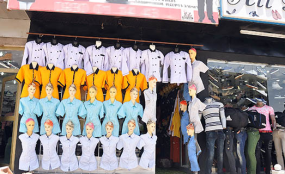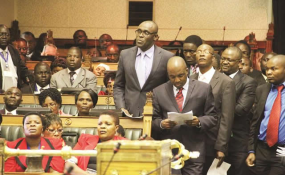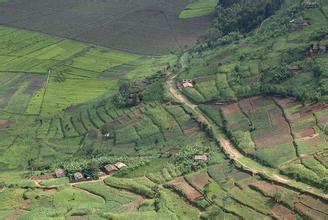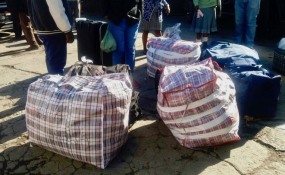EDITORIAL
One major drag to Ethiopia’s growth aspiration is perhaps the central bank and those we are in charge of the nation’s monetary policy affairs. At the helm of the National Bank of Ethiopia (NBE) are individuals who are passionate with inaction, despite volatility in the macro economic front. Their reluctance to use monetary policy tools, the preserve of central banks across the world, is simply legendary.
Nothing displays their reluctance and inaction better than their complacence with the status quo in the foreign exchange front. The Birr has been under assault lately, with its values plummeting against a basket of major currencies. Central bank’s inaction in safeguarding its value has consequences; depressingly though, no one appears to be held accountable for the opportunity cost this brings on the economy.
As of late, the Birr exchanges at a little less than 23 Br against the US Dollar at all banks in the country, a rate determined by the central bank. The same Dollar is however being traded at close to 27 Br in the underground market, a parallel market the state cracks down on to no avail. Ironically, it is the latter that shows the approximately real value of Ethiopia’s currency.
It is not unprecedented for the Birr to fall under such volatility. But a gap of nearly five Birr between the official and parallel market is a rare occurrence. There are a couples of factor driving the speedy depreciation of the Birr against major currencies. Although a widening gap between supply and demand could be the classic explanation, what drives the sudden surge in demand is where the story lies.
The market has now turned to a seller’s market. To the delight of property brokers, people who are with assets on offer for sale has gone up lately, a development fuelled by uncertainty over the country’s fate in a midst of alarming political crisis. Those who have succeeded in changing their physical assets to cash are unsurprisingly on a shopping spree for dollars and euro, currencies hard to come by from the banks. Although difficult to substantiate, the demand for housing in North America, generated from Ethiopia, has increased in recent weeks.
The deduction from this is that Birr is partly a collateral damage to the ongoing political turmoil Ethiopia has been going through for almost a year now. Partly though, the problem is deeply structural. Close to 70pc of the nation’s expenditure is on strategic goods, covering the bills for oil, fertilizer, wheat, and capital goods. Revenues from exports, which was at 2.8 billion dollars last year, is simply no much to over 20 billion dollars in import bills. The share of exports to the GDP has been on a decline since 2011, reaching a new low in 2015/16, according to the World Bank.
Revenues from remittance, grants and loans can only go as far as generating less than 10 billion dollars, leaving the economy to trail with massive deficit in the trade balance.
This has put Ethiopia in the league of countries such as Armenia, Cuba, Myanmar, Samoa, Uzbekistan, Venezuela and Zimbabwe, each of which is an economy in need of renewal and where there is strict exchange rate control regime in place. The IMF has in fact a name for them. It is an agreement made to allow emerging economies to exercise control over their exchanges in banning the use of foreign currencies within their territories; illegalizing citizens from possessing foreign currencies; restrict currency exchanges only to government approved agencies; limiting the amount of currency that could be imported and exported; and fixing exchange rates.
All of these are limitations imposed in Ethiopia, and enforced, albeit haphazardly. There are both opponents and proponents of such exchange rate regime with equally persuasive rationales. The latter would argue that relaxing control on the exchange front is simply passing a death sentence on an economy that is deeply flawed as a result of structural imbalances. Considering only financial variables in policy making could lead the economy to contraction and inflationary beast, a form of undeclared tax on the majority with fixed income.
For exchange controls give countries greater room to ensure economic stability due to volatility in currency movements, lifting these very limitation exposes them to crises, thus turmoil. The experience of Iceland, after the global financial meltdown of 2008, is a case proponents often raise in defense of their cause. It is legitimate.
But such crises should and can be managed with prudent deployment of policies. Rigid exchange rate, capital controls and limiting the import of goods are not the ingredients of a good economy, says Thomas Greenfield, an American economist, who recently reflected on the Nigerian experience. He argued that capital controls that limit access to foreign exchange rewards only insiders and undermines the stated goals of increased domestic production.
As the real exchange rate in Ethiopia surged by over 80pc, the Birr has become over valued and Ethiopia’s export competitiveness has been reduced drastically. The real effective exchange rate has appreciated in the past years, it has reached a record high of 179; the second highest at 148 was recorded in 2008.
By no means should this be taken as pleasant news. Ethiopia’s economy, which aspires to graduate as an export-oriented group, has lost its competitiveness to countries close and afar such as Kenya and Vietnam. Complacence in the face of loss and inaction where the worst is come is not a hallmark of prudent yet policy making.
A limited access to foreign exchanges engineered by the government will only move the country backwards, not forward. Ethiopia is no longer a society that competes within itself, but the world. The supply and demand mentality is what will inject entrepreneurships, free enterprise and drive its economy to a better destination. A free market economy is one, whose actors come, not within government, but from the ideals of free-market values.
Indeed, the call by the World Bank and the IMF for policy intervention in devaluing the value of the Birr may sound outlandish, considering the fear of contraction and inflation. It is also true that drop in export comes not from volume but value, indicating that the issue may have little to do in the inability to sell more, as Yohannes Ayalew, deputy governor of the central bank, argued last week at the Sheraton, when the World Bank presented its latest update on Ethiopia’s economy.
While speakers said that the contraction in the economy was not as bad as it was originally feared, and complimented the administration of Prime Minister Hailemariam Desalegn on the economic fundamentals, they said that the exchange front was seen as battle ground.
Both sides could, however, find a middle ground to work out the challenges and overcome the status quo. The country should not continue be held hostage to the impossibilities but its leaders should dare to experiment with what is possible in the interest of helping entrepreneurship expand and let foreign direct investments keep flowing.
A better future is one based on an economy driven by the ‘demand and supply’ dynamics, not one that is limited by state interventions. On the supply side, the Administration can continue to pursue its desire to diversify and boost exports; encourage the stream of remittances; and promote foreign investments. But it can only travel on this road as much. It can work on the demand side too.
Ethiopia’s growth should not be held back by an over cautious perception of what is called impossible but by striving to attain what is most certainly possible.
Ensuring political certainty to restore confidence among citizens compelled to speculate can take the country a long way. This takes bold political moves to be inclusive of voices and their representatives in the political process. Abandoning the dogmatic outlook of hyper expenditures on public infrastructure can also help address the constraint on the demand side. Not everything needs to be completed now; prioritizing mega state financed projects should be an option on the table, in the interest of easing the pressure on the Birr.
The Administration should follow the managed floating exchange rate regime to introduce some degree of competitiveness. This should not either be taken as something new, for the economy experienced such a market back in the 1990s. Sucking any form of competition out of such a valuable commodity as a currency is and acting business as usual while the Birr is battered should not be a legacy the Prime Minister should want to be remembered for. It begins with holding his officials at the central bank accountable for their inaction to date.










